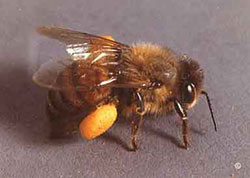
Colony Collapse Disorder was first reported in 2006. Colony Collapse Disorder is characterized as a rapid loss in bees.
Mites, disease, parasites, weather patterns, pesticides, poor nutrition and stress have been thought to be factors inciting Colony Collapse. No scientific cause for Colony Collapse has been proven.
Control of the varroa mite, sanitation, removal of affected hives, and improved nutrition are being used to combat Colony Collapse.
Many commonly used garden pesticides are toxic to bees. If the plant to be sprayed is blooming and attractive to bees, wait until the flowers are gone before applying a pesticide, or consider pest control solutions other than pesticides. When choosing to use pesticides, use the least toxic and always read label precautions carefully.
With the heightened awareness and active measures being taken, losses from Colony Collapse are decreasing. Research is ongoing in this area to determine the causes of Colony Collapse and better ways to actively manage the disorder.
For more information, see the following Planttalk Colorado™ video(s).
For more information, see the following Colorado State University Extension fact sheet(s).



